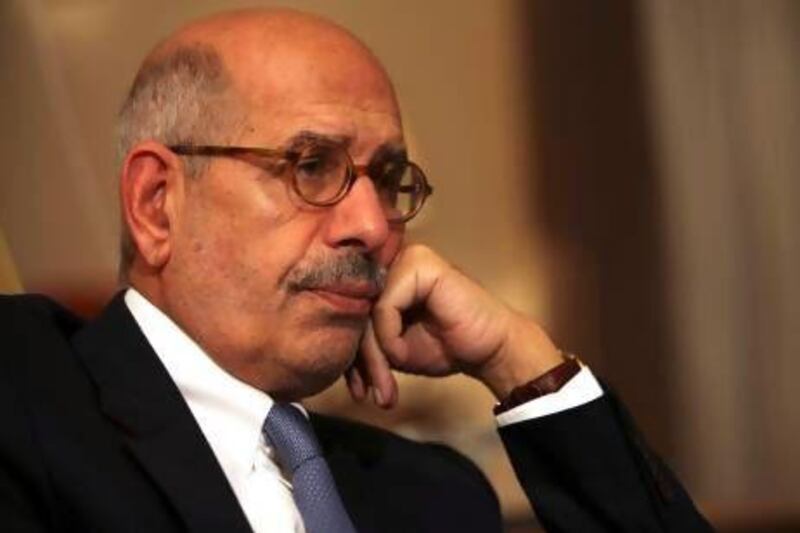CAIRO // The liberal reformist and Nobel Peace laureate Mohamed ElBaradei was named prime minister of Egypt's interim government yesterday.
Mr ElBaradei, 71, will lead an authority with the task of rewriting the constitution and organising fresh elections after the Islamist president Mohammed Morsi was deposed last week by the military amid massive nationwide protests demanding his departure.
The new prime minister was being sworn in last night by Adly Al Mansour, the interim president.
A former head of the International Atomic Energy Agency, Mr ElBaradei was a long-time opponent of the former president Hosni Mubarak, toppled in January 2011.
He declined to stand in the 2012 presidential election because of dissatisfaction with interim military rule, which he accused of violence and harassment, and the trial of revolutionaries in military courts.
Mr Al Mansour held talks earlier yesterday with the army chief and defence minister, General Abdel Fattah El Sisi, and interior minister Mohammed Ibrahim in an apparent attempt to work out strategies to contain further violence following overnight clashes in which more than 30 were killed.
The capital had largely returned to calm yesterday but, vowing to defy military leaders, Mr Morsi's supporters continued to demonstrate in support of the man they consider their democratic leader.
Outside Cairo University, they have rallied in their tens of thousands over the past week, with violent exchanges between police, demonstrators and - according to reports collected by Human Rights Watch - armed civilians from both sides.
Eighteen people were reported killed in clashes there on July 2, but protesters gathering there yesterday insisted that they would continue to rally.
With his face and neck heavily bandaged and a broken arm, Walid Al Hillaly, 33, said he was coming to participate in a demonstration after having been injured in deadly clashes on Friday evening as Morsi supporters marched on the Republican Guard headquarters.
"I'm coming today to sit here," he said. "It's my faith in God, in the Islamic religion, and faith in the president and in democracy." A small crowd of people jostled around him, insisting that Mr Morsi should be restored to power and that a transitional authority, presided over by the army, was unacceptable.
"I want to prove the value of democracy," said Walid Hagag, 33, a student of engineering and religious law, from the top of a makeshift podium outside the university from which he planned to address crowds later.
As men with sticks guarded the space outside the university, where examinations have been suspended, and women in niqabs cleared the debris of clashes, Mr Hagag criticised Gen El Sisi.
"It's not good for El Sisi to come in a tank and smash the democratic values," Mr Hagag said.
He also warned that Islamist political groups, some of which had compromised on an ideological objection to elections to participate in the presidential and parliamentary polls after the fall of Mubarak, may now reject the democratic process altogether.
Some Islamist groups, including the hardline Hezb Al Nour party, have supported the military intervention to remove Mr Morsi, who is backed by the Muslim Brotherhood. But others have reservations about the arrest of senior Brotherhood figures and the suspension of Islamist television channels.
Abboud El Zomor, a senior leader of Gama'a Islamiyya, who spent 30 years in prison for his role in the 1981 assassination of Anwar Sadat, said the military was acting in good faith when it deposed Mr Morsi, but the generals made a crucial mistake in not including more of the Islamist political spectrum.
"They have made a road map without consulting the majority who elected Morsi," he said of the military.
The interim president should hold a national referendum on the road map to give the plan legitimacy, he said.
Gama'a Islamiyya, along with the Brotherhood, was a target of the Mubarak regime's security apparatus for decades. The ongoing trial of Mubarak, who is facing charges of charges of corruption and involvement in the killing of protesters during the 2011 uprising, was adjouned yesterday to August 17.
The leader of the Brotherhood, Mohammed Badie, also denounced the Coptic Pope, Tawadros II, for endorsing the military "road map" for the country. State media reported that the Islamist leader said yesterday that the pope no longer stood for the Copts. Amid the rising religious tensions, a Coptic priest was reported shot dead yesterday in the Sinai city of Al Arish, where radical Islamists have rallied in the past week.
Both supporters and opponents of Mr Morsi and the Muslim Brotherhood buried their dead yesterday in funerals simmering with tension. Thousands gathered for a group burial in the Manial area of Cairo, where those attending said at least five people were killed on Friday night by armed Morsi supporters after residents tried to prevent the men from reaching a demonstration in Tahrir Square.
Meanwhile, Morsi supporters chanted for the fall of military rule at another funeral as they buried Mohamed Sobhy, a supporter of Mr Morsi who was killed on Friday at demonstrations outside the Republican Guard headquarters. His relatives at the funeral in Nasr City in the capital said he had been shot in the head by members of the security forces.
"I'm not political, but I am ashamed of what happened yesterday," said Yousef Azab, 26, a student attending the funeral. "I think that there are many Brothers who are violent, but not all of them are violent, and none of them deserve to be shot in the head."
* Additional reporting by Bradley Hope and Jahd Khalil





